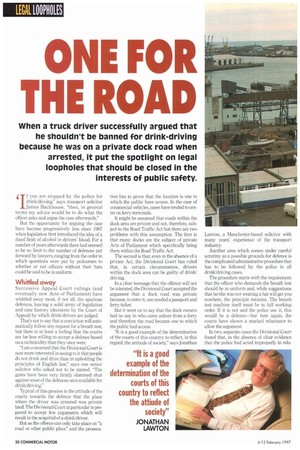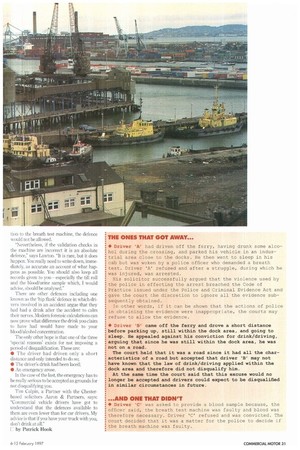ONE FOR THE ROAD
Page 32

Page 33

If you've noticed an error in this article please click here to report it so we can fix it.
When a truck driver successfully argued that he shouldn't be banned for drink-driving because he was on a private dock road when arrested, it put the spotlight on legal loopholes that should be closed in the interests of public safety.
1
g f you are stopped by the police for
drink/driving," says transport solicitor James Backhouse, "then, in general terms my advice would be to do what the officer asks and argue the case afterwards."
But the opportunity for arguing the case have become progressively less since 1967 when legislation first introduced the idea of a fixed limit of alcohol in drivers' blood. For a number of years afterwards there had seemed to be no limit to the number of defences put forward by lawyers, ranging from the order in which questions were put by policemen to whether or not officers without their hats could be said to be in uniform.
Whittled away
Successive Appeal Court rulings (and eventually new Acts of Parliament) have whittled away most, if not all, the spurious defences, leaving a solid array of legislation and case history (decisions by the Court of Appeal) by which drink/drivers are judged.
That's not to say that a conviction will automatically follow any request for a breath test, but there is at least a feeling that the courts are far less willing to accept a defence based on a technicality than they once were.
"I am concerned that the Divisional Court is now more interested in seeing to it that people do not drink and drive than in upholding the principles of English law," says one senior solicitor who asked not to be named. The gates have been very firmly slammed shut against most of the defences once available for drink/driving."
Typical of this process is the attitude of the courts towards the defence that the place where the driver was arrested was private land. The Divisional Court in particular is prepared to accept few arguments which will result in the acquittal of a drink/driver.
But as the offence can only take place on "a road or other public place" and the prosecu tion has to prove that the location is one to which the public have access. In the case of commercial vehicles, cases have tended to centre on ferry terminals It might be assumed that roads within the dock area are private and not, therefore, subject to the Road Traffic Act but there are two problems with this assumption. The first is that many docks are the subject of private Acts of Parliament which specifically bring them within the Road Traffic Act The second is that, even in the absence of a private Act, the Divisional Court has ruled that, in certain circumstances, drivers within the dock area can be guilty of drink/ driving.
In a clear message that the offence will not be tolerated, the Divisional Court accepted the argument that a dock road was private because, to enter it, one needed a passport and ferry ticket.
But it went on to say that the dock owners had no say in who came ashore from a ferry and therefore the road became one to which the public had access.
"It is a good example of the determination of the courts of this country to reflect, in this regard, the attitude of society," says Jonathan Lawton, a Manchester-based solicitor with many years' experience of the transport industry.
Another area which comes under careful scrutiny as a passible grounds for defence is the complicated administrative procedure that has to be followed by the police in all drink/driving cases.
The procedure starts with the requirement that the officer who demands the breath test should be in uniform and, while suggestions that he/she was not wearing a hat will get you nowhere, the principle remains. The breath test machine itself must be in full working order. If it is not and the police use it, this would be a defence—but here again, the courts have shown a marked reluctance to allow the argument.
In two, separate cases the Divisional Court found that, in the absence of clear evidence that the police had acted improperly in rela tion to the breath test machine, the defence would not be allowed.
"Nevertheless, if the validation checks in the machine are incorrect it is an absolute defence," says Lawton. "It is rare, but it does happen. You really need to write down, immediately, as accurate an account of what happens as possible. You should also keep all records given to you—especially the till roll and the blood/urine sample which, I would advise, should be analysed."
There are other defences including one known as the 'hip flask' defence in which drivers involved in an accident argue that they had had a drink after the accident to calm their nerves. Modern forensic calculations can now prove what difference the drink you claim to have had would have made to your blood/alcohol concentration.
The only other hope is that one of the three 'special reasons' exists for not imposing a period of disqualification. These are: • The driver had driven only a short distance arid only intended to do so; • The driver's drink had been laced; • An emergency arose.
In the case of the last, the emergency has to be really serious to be accepted as grounds for nor d squa I ifying you.
Tim Culpin, a Partner with the Chesterbased solicitors Aaron 8z Partners, says: "Commercial vehicle drivers have got to understand that the defences available to them are even fewer than for car drivers. My advice is that if you have your truck with you, don't drink at all."
r by Patrick Hook










































































































